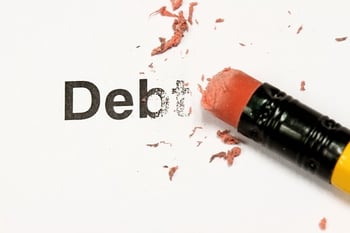 Bankruptcy is a serious legal tool that shouldn't be entered into lightly. Fortunately, it can, in specific situations, help you move forward toward greater financial freedom.
Bankruptcy is a serious legal tool that shouldn't be entered into lightly. Fortunately, it can, in specific situations, help you move forward toward greater financial freedom.
Chapter 7 is a specific chapter in the federal bankruptcy laws that represents what is known as straight or liquidation bankruptcy and that can wipe your financial slate clean.
If your bills have become insurmountable and keeping up with the costs of daily living is no longer possible, a Chapter 7 bankruptcy can work as a financial do-over that allows you to move beyond the financial rubble you find yourself in. It's important to note that Chapter 7 bankruptcy is not without serious consequences that can include relinquishing possessions and taking a serious hit on your credit score.
How Chapter 7 Works
At the most basic level, Chapter 7 bankruptcy automatically initiates a temporary hold on your current debts that stops creditors from continuing to engage in any of the following practices:
- Attempting to collect payments
- Attempting to garnish your wages
- Attempting to foreclose on or evict you from your home
- Attempting to turn off your utilities
- Attempting to repossess your property
From here, the court will take legal possession of your property and will appoint a bankruptcy trustee to your Chapter 7 bankruptcy case.
Your Trustee
Your trustee is responsible for overseeing your bankruptcy from start to finish. He or she will carefully review your financials, including all assets and debts; will sell any nonexempt properties (properties that bankruptcy laws won’t allow you to keep); and will distribute the sale’s proceeds amongst your creditors (to help pay off current debt).
Exempt Property
There are certain types of properties that the court will not require you to give up, and these exempt properties generally include:
- Your primary vehicle
- Your clothing
- Your household goods, furnishings, and appliances
- Your jewelry (up to a specified value)
- Your pension
- Tools of your trade or profession
- Equity in your home
- Any public benefits received
- Damages awarded in a personal injury claim or case
Each of these exemptions will be assessed to ensure that it falls within reasonable parameters. For example, if you own a treasure trove of designer clothing (that has resale value), it’s unlikely that you’ll be allowed to keep it all.
Nonexempt Property
The kinds of property that you will likely be required to relinquish for the trustee to sell include:
- Your home or vehicle
- , if you have sufficient equity in them
- Cash, bank accounts, stocks and bonds, and other investments
- Valuable family heirlooms
- Valuable collections, including stamps, coins, jewelry, watches, art, or anything else of considerable worth
- Valuable musical instruments (professional musicians excluded)
Those things of value that you own but that are not essential for living on a day-to-day basis are likely not to be exempt from liquidation. The total amount of property that you’ll be allowed to retain varies by state, but overall, Chapter 7 bankruptcy cases tend to be what is called a no-asset case, which means that all of the personal property you are allowed to retain must be either exempt or have a valid lien against it.
The Basic Chapter 7 Process
The basic steps in your Chapter 7 bankruptcy include the following:
- Consult with an experienced NYC bankruptcy attorney (bankruptcy is a complicated legal matter, and you are well-advised to proceed with professional legal counsel in your corner)
- Compile and fill out your bankruptcy paperwork (your attorney will go over this with you to ensure it is accurate and complete)
- Take your credit counseling course, which can be done online
- Sign and file your bankruptcy papers
- Send any necessary verification documents to the trustee in your case
From here, there will be what is known as a 341 meeting of creditors, which both you and your bankruptcy attorney will attend, and at which you will answer questions about your bankruptcy paperwork and your financial situation. You will also be required to attend a debtor education class that your bankruptcy attorney can attend with you and a financial management class that can be attended online. Finally – if you are successful in obtaining a Chapter 7 bankruptcy – your debts will be discharged, which means that all your debts that can be wiped clean will be. There are, however, certain kinds of debt that cannot be cleared by Chapter 7 bankruptcy, including:
- Certain kinds of taxes
- Child or spousal support obligations
- Fees owed to the government
- Court fees
- Most student loans
Chapter 7 bankruptcy amounts to exchanging your debt for your nonexempt assets, and it tends to be a better option for those who have fewer nonexempt assets – or for those whose debt load far exceeds their assets. Once your trustee collects, liquidates, and distributes your assets, your debts will be discharged; your case will be closed; and you will move forward with a fresh financial start.
Who Qualifies for Chapter 7 Bankruptcy?
In order to qualify for a Chapter 7 bankruptcy, you must meet the following requirements:
- You completed an individual or group credit counseling course provided by an approved credit counseling agency no more than 180 days before filing.
- Your average monthly income for the six months prior to filing was less than your state’s median income (for a family of your size). If this isn’t the case, you must be able to pass a means test that determines if you have sufficient disposable income to make at least partial payments to your unsecured creditors. If you don’t pass this means test, however, Chapter 13 bankruptcy may be an option for you.
- You haven’t filed a Chapter 7 bankruptcy for at least eight years prior to this filing.
- You haven’t filed a Chapter 13 bankruptcy for at least seven years prior to this filing.
- If, during the 181 days prior to this filing, you filed a Chapter 7 or Chapter 13 bankruptcy that was dismissed, you'll need to hit this 181-day waiting period before trying again.
- Even if you qualify to file, the court may dismiss your case outright if it finds that you were attempting to defraud your creditors prior to filing, such as by running up your credit card artificially – knowing that you were preparing to file for bankruptcy (in a preemptive attempt to avoid paying the debt).
How Long Is the Bankruptcy Process?
While every bankruptcy case is unique to the circumstances involved, the bankruptcy process generally takes about four to six months from your initial credit counseling until your remaining debts are discharged. If you have properties that need to be sold and/or you need to submit additional documentation and bookwork, your bankruptcy case could take longer. Further, if you attempt to discharge student loan debt, which isn’t common but is sometimes possible, you are very likely looking at a lengthy trial ahead.
For How Long Will My Credit Be Affected?
Bankruptcy is a major blemish on your credit history, and there is no way around this fact. Nevertheless, a Chapter 7 bankruptcy can turn your finances around, so it’s important to weigh what you stand to gain with the losses involved. A Chapter 7 bankruptcy can remain in your credit history – and on your credit reports – for up to 10 years after the date that you file. Because most instances of bad credit fall off credit reports after seven years, the accounts that were included in your bankruptcy case may be removed from your report before your bankruptcy disappears.
The Potential Cons of Chapter 7 Bankruptcy
Deciding to move forward with a Chapter 7 bankruptcy is a big decision that can have both positive and negative consequences (simultaneously), which makes carefully considering the pros and cons of Chapter 7 critical.
Credit Concerns
A Chapter 7 bankruptcy will leave your credit rating in shambles, and it’s very likely to leave you without a credit card. With time, however, you’ll be able to build your credit back up. Additionally, if you’re considering bankruptcy, your credit is likely already in pretty meager shape.
Property Loss
Property loss can be one of the biggest drawbacks of a Chapter 7 bankruptcy. Any nonexempt property (as discussed above) will be liquidated and distributed to your debtors.
Remaining Debt
After obtaining a Chapter 7 bankruptcy, certain debts and liabilities can remain, such as mortgage liens, alimony and/or child support payments (including payments that are in arrears), and student loan debt.
Conversion to Chapter 13 Bankruptcy
Sometimes, if the filer has considerable disposable income, the courts will convert a Chapter 7 bankruptcy to a Chapter 13 bankruptcy. In a Chapter 13 bankruptcy, you’ll likely be required to repay the bulk of your outstanding debt over a period of from three to five years.
Difficulty Obtaining a Mortgage
With a bankruptcy on your record, it can be very difficult to obtain a mortgage, which can mean that purchasing a home will be out of reach until the bankruptcy is removed from your credit report. This doesn’t, however, mean that it will be impossible for you to find a lender who is willing to work with you.
The Potential Pros of Chapter 7 Bankruptcy
Now, let’s consider the upside to obtaining a Chapter 7 bankruptcy.
Saves Time and Avoids Litigation
If you’re drowning in debt, you’re going to have creditors seeking payment, and this can lead to litigation. With a Chapter 7 bankruptcy, you can take care of the entire matter in as little as a few months and can generally avoid litigation entirely.
Avoids Aggressive Debt Collection Practices
Debt collectors aren’t usually shy about coming after debt that’s owed them, and it can feel like they’re coming at you from all angles. Once you file for a Chapter 7 bankruptcy, it will automatically halt creditors’ invasive practices and will allow you to focus on your journey forward toward greater financial freedom.
Removes Most Debt
Chapter 7 bankruptcy can eliminate many types of debt, including:
- Attorney fees
- Bad checks
- Business debt
- Charge accounts
- Civil judgments, including traffic accident claims
- Collection agency accounts
- Payday loans
- Personal loans
- Social Security overpayments
- Tax penalties and back taxes
- Utility bills
Reach out to an Experienced Minnesota Bankruptcy Attorney
If you are considering a Chapter 7 bankruptcy, you are facing considerable financial hardship, and you can use a helping hand. Fortunately, the accomplished bankruptcy attorneys at Kain & Scott in Minnesota are here to oblige. We understand your financial dilemma, and we have the compassion and legal skill to help you find your way out. To learn more about what we can do to help you, please give us a call or contact us online today.


